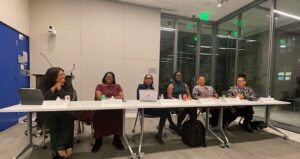Four criminal justice experts from across the country discussed inequalities in the U.S. criminal justice system and the disproportionate impacts of incarceration on Black women in an online public dialogue on Feb. 4.
The seminar featured the perspectives of four Black women activists, all of whom have been impacted by the failures of the criminal justice system and represent organizations that seek to support others who have faced its injustice. The event covered topics such as the role of stereotypes in the treatment of Black women in prisons, the unique experiences of incarcerated Black women, and the effects of the pandemic on incarceration.
Anna Misleh, project manager of Georgetown’s Initiative on Catholic Social Thought and Public Life, which co-sponsored the event, moderated the discussion. Her introduction was followed by remarks from Haley Wierbicki (COL ‘21), an assistant at Georgetown’s Women’s Center, who reflected on the poor conditions in women’s prisons and Georgetown’s efforts to combat criminal injustice. These efforts include its year-long Pivot Program, in which formerly incarcerated citizens can earn a certificate in business and entrepreneurship as they re-enter the workforce, as well as undergraduate classes such as “Prisons and Punishment” with Professor Marc Howard designed to educate students about the criminal justice system.
Panelists then discussed stereotypes about Black women in the U.S., stereotypes which can have harmful consequences such as dismissing Black women’s struggles and experiences. These stereotypes are particularly harmful when they involve the criminal justice system, where decisions affecting the conditions of incarceration can have immense impacts on a person’s life.
Syrita Steib, co-founder and executive director of Operation Restoration, a New Orleans-based organization that aims to support women and girls impacted by incarceration, explained how overestimation of Black women’s pain tolerance can lead to mistreatment, dehumanization, and undue suffering, especially in the context of incarceration. These stereotypes create additional challenges for Black women as they face the additional burdens of racial and gender-based discrimination and stereotyping in addition to that of incarceration. “Black women are disregarded in the system,” Steib explained. “Black women are often viewed as people who can endure pain, who may not be superior in intelligence, and also who are traditionally always at the bottom of the totem pole of any system.”
Sherri Davis, a graduate of the Pivot Program and executive program assistant and office manager at Democracy Initiative, pointed out the effects of negative stereotypes such as “angry Black women with drama.” She pointed out how these assumptions are not only inaccurate, but also contribute to the neglect of Black women in prison, particularly in supplying feminine hygiene products. While many people requiring menstrual products while incarcerated frequently struggle to access these products, the racist and sexist stereotypes of Black women can make it even more difficult for them to have these essential needs met, Davis explained.
Despite seeming less overtly negative, stereotypes of Black women as “superwomen” can also have damaging consequences. Generalizations like these contribute to Black women being ignored during their incarceration, Ashley McSwain, the executive director of Community Family Life Services in Washington, D.C. argued. McSwain noted the stereotype that Black women are expected to both hide their own pain and act as primary caregivers creates expectations which can make incarceration especially difficult for Black women and their families. While men are often supported by female relatives when incarcerated, such support is frequently unavailable to incarcerated Black women.
“You arrest a woman, you’re arresting her whole family,” Steib said. “Everyone’s incarcerated when a woman goes to prison.”
The panelists also discussed the traumatic experiences that Black women face in poorly-maintained women’s prisons. Incarcerated women often face abuse from prison guards, particularly male ones. Davis divulged difficult experiences she had undergone while imprisoned, including subjection to a full body cavity search after meeting with her family. She emphasized that the struggles that face women are often the result of racist and discriminatory policies, which cause women just as much harm as they do men. “The war on drugs saw a lot of our sisters incarcerated. And they are the forgotten voices. Black lives matter and Black women are just as much a part of that movement as Black men,” she explained.
Life post-incarceration holds unique difficulties as well, the panelists explained. Many formerly incarcerated Black women struggle to cope with trauma after imprisonment and struggle to find jobs to support their families. Kimberly Lymore, a pastoral associate at The Faith Community of St. Sabina, a Third Day Church in Chicago, said support group circles and safe space healing can help formerly incarcerated people recover from this trauma. She also emphasized the Church’s responsibility in advocating for reform in women’s prisons, as the prison reform movement often fails to give attention to the struggles of incarcerated women.
This lack of attention to women’s issues contributes to the rise in female incarceration, Steib noted. Although men still make up a majority of the imprisoned population, she said, rates of incarceration for women have risen by over 800 percent in the last 40 years. The war on drugs and a lack of opportunities for education has contributed to this reality, according to Steib. . Given that Black women suffer from higher rates of imprisonment than their white counterparts, this increase in imprisonment has led to a crisis of over-incarceration disproportionately impacting Black women. “The war on drugs treated Black women as if they were just collateral consequences,” McSwain added.
When asked what non-incarcerated people can do to support Black women facing incarceration, the panelists called for understanding, compassion, and dignity. “Say, ‘We see you,’” Lymore encouraged. “Give them dignity.”






